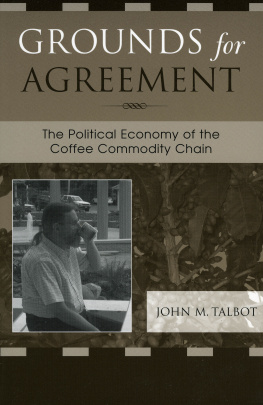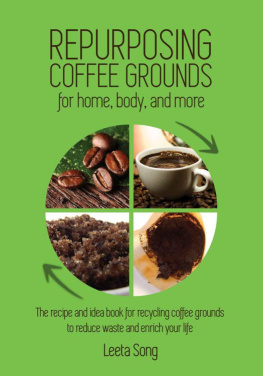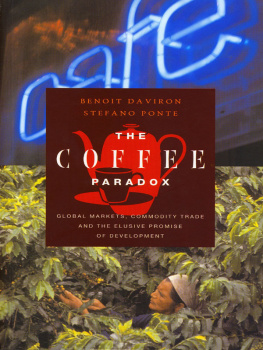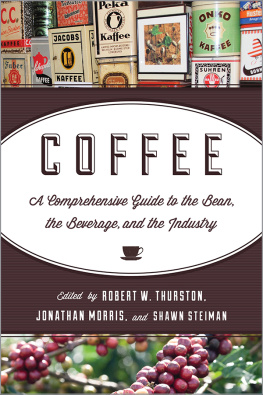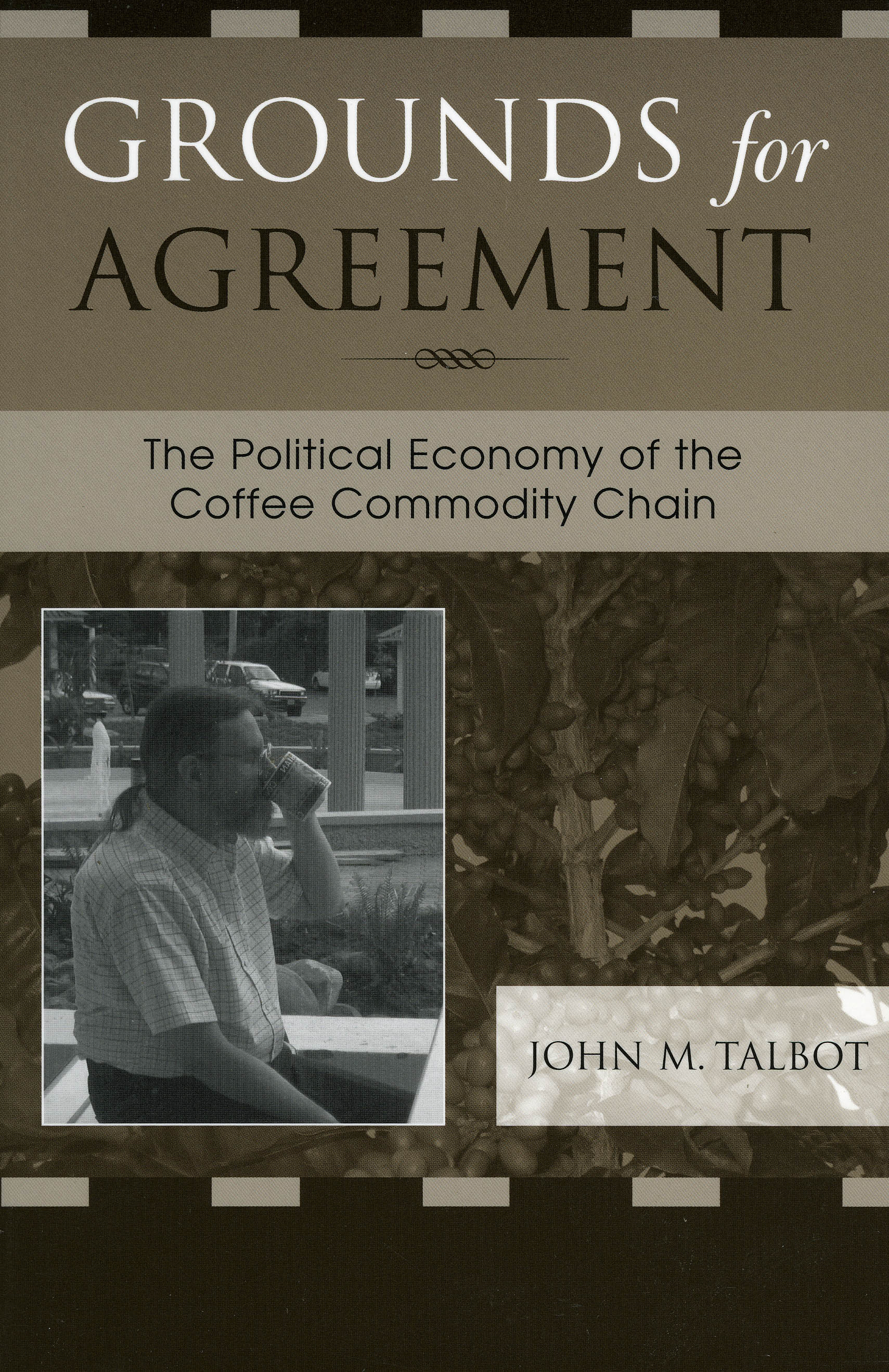Acknowledgments
This book is the product of over ten years of research, thinking, and writing about coffee, a subject that continues to fascinate me. As is the case with any project this large, there are numerous people and organizations that have assisted, supported, and even inspired me to keep at it and eventually finish it. I cant thank all of them by name, so let me begin with a blanket thank you to everyone who helped me with this project, not elsewhere specified.
Beyond the intellectual debts to those whose work I have built on, who are acknowledged in my notes and bibliography, my main intellectual debt is to my original dissertation committee from the University of California at Berkeley. Peter Evans, who was the chair, was the ideal thesis advisor, and has continued to help me to think strategically about research, writing, and my academic career. Laura Enriquez was a very careful reader who helped me to develop my ability to state my arguments clearly and consistently. Brian Wright helped me to clarify my economic thinking and to make my sociological and political arguments more intelligible to economists. Philip McMichael, though not a member of the committee, has consistently supported and encouraged my research in this area. Finally, I would like to thank all of the members of the Political Economy of the World-System section of the American Sociological Association, and of the International Sociological Associations Research Committee on Food and Agriculture (RC40), who have commented on my various papers and presentations on the coffee commodity chain over the years. Any shortcomings of this book are probably due to my decisions to ignore sound advice from these people.
I would also like to thank all of the people who gave their time to help me with the research that went into this book. First and foremost are C. P. R. Dubois and his able staff at the International Coffee Organization. They opened their library to me during the initial stages of the research, and have continued to take the time to provide me with the documents and statistics I needed to update my analyses. I also interviewed several key people involved in the coffee commodity chain in various ways, who gave me many insights into how it worked. Jim Reynolds of Peets Coffee and Bert and Elmer Fulmer of Gold Mountain Coffee gave me the perspectives of the specialty coffee roaster and the coffee trader, respectively. Neil Rosser of ED&F Man provided the perspective of the TNC traders. Salim Janna, at the time the United States and Canada representative of Colombias Federacin Nacional de Cafeteros , explained Colombias marketing operations in North America. Ted Lingle, Executive Director of the Specialty Coffee Association of America, and George Boecklin, at the time the Executive Director of the National Coffee Association, provided insights into how their organizations worked and helped me to understand the overall structure of the U.S. coffee industry. I am particularly grateful to Nestor Osorio, now the Executive Director of the International Coffee Organization, who, at the time I interviewed him, was Colombias Permanent Representative to the ICO, and a key player in the 1989 and 1993 negotiations. He spent a great deal of time discussing these negotiations and Colombias positions in them, helping me to understand how the International Coffee Agreements (ICAs) worked, and ultimately failed. Finally, a source close to the 1993 negotiations on the U.S. side, who wished to remain anonymous, also provided valuable insights into the process. Obviously, none of these people bear any responsibility for the uses I have made of, or the interpretations I have placed on, the information they provided; but without it, I could not have completed this project.
This book is the culmination of a long process of research and writing, and during that time I have published a series of articles about coffee. Some findings and conclusions from each of those articles have been incorporated into this book, in many cases in significantly revised and updated form. I would like to thank all of the publishers who allowed me to use this previously published material here. Greenwood Publishing Group published my first article, The Regulation of the World Coffee Market: Tropical Commodities and the Limits of Globalization, in Philip McMichaels Food and Agrarian Orders in the World-Economy (Praeger, 1995), parts of which appear in chapters 1 and 3. The Berkeley Journal of Sociology published Regulating the Coffee Commodity Chain: Internationalization and the Coffee Cartel, in Volume 40, 19951996, parts of which are used in chapters 3 and 4. Latin American Research Review published The Struggle for Control of a Commodity Chain: Instant Coffee from Latin America, in Volume 32, 1997; parts of this article appear in chapters 6 and 7. Studies in Comparative International Development published Where Does Your Coffee Dollar Go?: The Division of Income and Surplus along the Coffee Commodity Chain, in Volume 32, 1997; the bulk of chapter 7 is a revised and updated version of this paper. Information, Finance, and the New International Inequality: The Case of Coffee, was published in the Journal of World-Systems Research, Volume 8, 2002 (). Last but not least, I would like to thank my brother, Peter J. Talbot, for his expert editing on the cover photo.
This book is dedicated to my parents, James and Margaret Talbot, who have supported and encouraged me through the entire process. Without their love and understanding, I doubt that I could have finished it. The book is also dedicated to my good friend, Luis Arturo Betancourt, who first got me interested in coffee as a subject for political-economic analysis, and introduced me to the production end of the chain in Colombia. I wish that he had lived to see this final product.
About the Author
John M. Talbot received his Ph.D. in sociology from the University of California, Berkeley. He is currently a lecturer in sociology at the University of the West Indies, Mona campus, Jamaica, where he teaches courses on globalization, research methods, and statistics. His research interests include international political economy and structures of international inequality, the sociology of food, and environmental sociology. In addition to studying coffee, he also enjoys drinking it.
Bibliography
Akiyama, Takamasa. 2001. Coffee Market Liberalization since 1990. In Commodity Market Reform: Lessons of Two Decades, eds. Takamasa Akiyama, John Baffes, Donald Larson, and Panos Varangis, 83120. Washington, DC: World Bank.
Akiyama, Takamasa, and Panayotis Varangis. 1989. Impact of the International Coffee Agreements Export Quota System on the Worlds Coffee Market. PPR Working Paper WPS-148, International Commodity Markets Division, International Economics Department, World Bank, February.
. 1990. The Impact of the International Coffee Agreement on Producing Countries. World Bank Economic Review 4:15774.
Andersen, Regine. 2000. How Multilateral Development Assistance Triggered the Conflict in Rwanda. Third World Quarterly 21:44156.
Andrews, Margaret. 1992. Avenues for Growth : A 20-Year Review of the US. Specialty Coffee Market . Long Beach, CA: Specialty Coffee Association of America.
Arrighi, Giovanni. 1994. The Long Twentieth Century: Money, Power and the Origins of Our Times. London: Verso.
Arrighi, Giovanni, and Jessica Drangel. 1986. The Stratification of the World-Economy: An Exploration of the Semiperipheral Zone. Review 10:974.
Bates, Robert. 1997. Open-Economy Politics: The Political Economy of the World Coffee Trade . Princeton, NJ: Princeton University Press.

